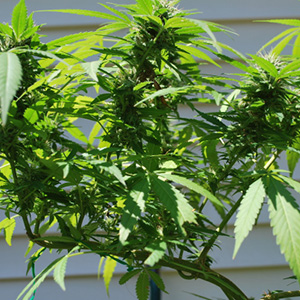In this contributor article, Amy Zukeran of Amy’s Cannabis Garden explains how MMJ can be used to alleviate the symptoms of CP, MS, and Epilepsy.

The following is an article produced by a contributing author. Growers Network does not endorse nor evaluate the claims of our contributors, nor do they influence our editorial process. We thank our contributors for their time and effort so we can continue our exclusive Growers Spotlight service.
Grouping these diseases together may seem capricious in an article about medical marijuana. But the truth of the matter is that these afflictions involve tight muscle spasticity, seizures, and chronic pain. This blogger decided to write something that will, with hope, clarify the use of medical marijuana (MMJ) for these three different chronic illnesses.
Definitions are in order, because if you don’t suffer from these diseases, you probably have very little knowledge of them:
- Cerebral Palsy or CP, is a lifelong, non-progressive motor condition that affects bodily movement. It is thought to be caused by damage to motor control centers in the developing brain. There is a marked reduction of reflexes, posture, speech, muscle control and coordination, learning and cognitive functions. Epilepsy is common in CP patients. It is estimated that CP afflicts 1.5-4 births per 1000 live births.
- Spastic quadriplegia is the most serious form of CP. It affects all four limbs, face and torso. The majority of people who have this form of CP are typically unable to walk and have profoundly affected speech.
- Multiple Sclerosis or MS, is a disease where the body’s own immune system attacks the nervous system, destroying the myelin sheath, which acts as insulation for nerve fibers. This, in turn, damages nerve fibers and disrupts nerve signals to and from the brain. While MS’s precise causes are unknown, it’s believed to be a genetically transmitted disease that can be triggered after possibly encountering environmental factors. It is estimated that there are 2.5 million MS sufferers worldwide.
- Epilepsy is a brain disorder where clusters of neurons signal abnormally, causing convulsions, strange sensations or behavior, muscle spasms and loss of consciousness. This may be caused by brain damage, abnormal brain development and/or genetics. It is estimated that there are 39 million epilepsy-afflicted people worldwide, making this the most common neurological disorder globally.
The three aforementioned afflictions have tight muscle spasticity, cognitive dysfunction, muscle coordination problems and chronic pain in common. All of which MMJ has been documented to help alleviate.
Studies of these Illnesses
There have been numerous studies that have shown that MMJ can help manage symptoms like seizures, muscle spasms and other painful conditions.
A 2007 National Institute of Health study concluded that “active compounds in cannabis helped to control partial seizures, typical in people with spastic quadriplegia.” Another 2011 NIH study concluded, “the treatment that was rated or providing the most relief was marijuana.” A 2013 Tel Aviv University study showed cannabidiols, or CBDs, helping MS-afflicted mice. Mice whose legs were locked, were able to walk again with the administration of CBD oils. This same study found that both CBD and THC are anti-inflammatories.
In 2013, the Journal of Neurology, Neurosurgery and Psychiatry published an article which said THC was found to assist in the prevention of damage caused by free radicals and by activating a receptor which then creates more mitochondria, the body’s miniature power packs for cell function. There is mounting evidence that cannabis acts as a neuroprotective agent through improvement of mitochondrial function and cellular-level debris clearance.
A 2014 NIH study showed MMJ was effective in decreasing the incidences of painful muscle spasms – one of the symptoms felt by all three mentioned groups of afflicted people. In an another 2014 encouraging sign, the American Academy of Neurology, Neurologists and Neuroscientists released summary guidelines regarding MMJ and its derivatives. It said that oral cannabis extracts and synthetic THC is probably effective for decreasing spasticity and pain.
Recently, the Mayo Clinic found that both cannabis and hemp seed oil are effective in treating cancer and the aftermath of chemotherapy; MS; epilepsy; neuromuscular disorders; glaucoma; HIV – AIDS; Tourette’s syndrome; terminal illness; Lou Gehrig’s disease or ALS and chronic pain.
Lastly, the National Multiple Sclerosis Society announced that they support the right of patients to work with physicians who can recommend cannabis as a viable solution to addressing symptoms in those states where this is legal. The society also encourages further research into marijuana to understand the potential benefits of this drug.
Conclusions
Arguably, MMJ is an ancient, natural, potentially powerful drug of the future as continuing research explores its compounds, including cannabinoids. There are a wide variety of uses for cannabis and its derivatives, as we have explored:
- Many cannabinoids are thought to be anti-inflammatories, calming the immune system and preventing immune cells from attacking nerve fiber insulation, myelin.
- CBD also contributes to neurogenesis. This simply means that they are capable of creating new brain cells.
- CBD is a potent analgesic. This goes hand in hand with cannabis’ anti-inflammatory qualities. The end result should be a decrease in pain.
- Everyone has heard the rumor of “the munchies” associated with smoking marijuana. Well, it is true. CBDs engage immune cells and quells bowel inflammations, quiets nausea and vomiting; relaxes stomach muscles; and eventually relieves diarrhea.
- MMJ encourages sleep, which can be a problem for MS and CP sufferers. Those dealing with pain can derive benefit from this drug as well.
- Cannabis also decreases inflammation of the optic nerve. It inhibits macular degeneration and mediates glaucoma symptoms.
10 Best Gift Ideas for Cannabis Connoisseurs and Growing Aficionados (2022)
December 7, 2022Developing and Optimizing a Cannabis Cultivation System
December 14, 2021Dealing with Insomnia: How Can CBD Help?
December 10, 2020Your Guide to Sleep and CBD
December 7, 2020
Do you want to receive the next Grower's Spotlight as soon as it's available? Sign up below!
Resources:
Want to get in touch with Amy? She can be reached via the following methods:
- Website: http://amys-cannabis-garden.com/

Do you have any questions or comments?

About the Author
Amy was born and raised in the Puna Bud Capital of the World -- Hawai'i. She is genetically programmed to write and also explore medical cannabis so visit her blog. Mahalo Nui Loa!